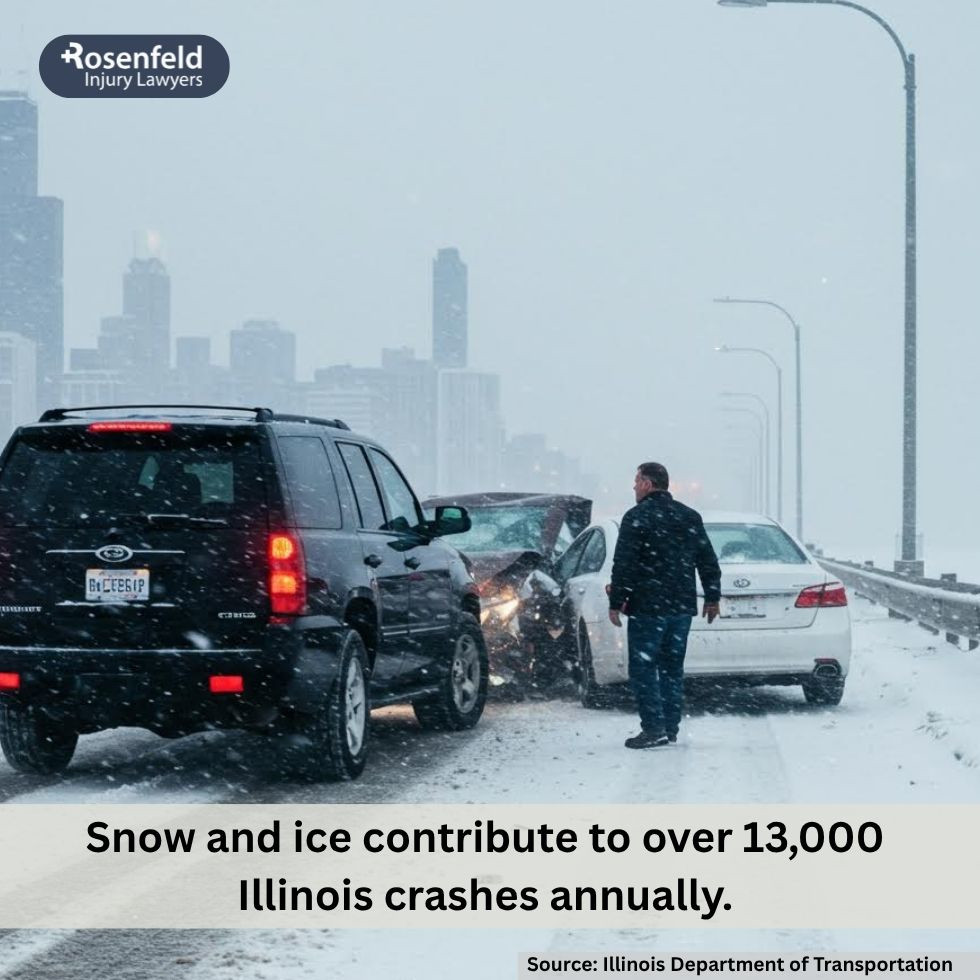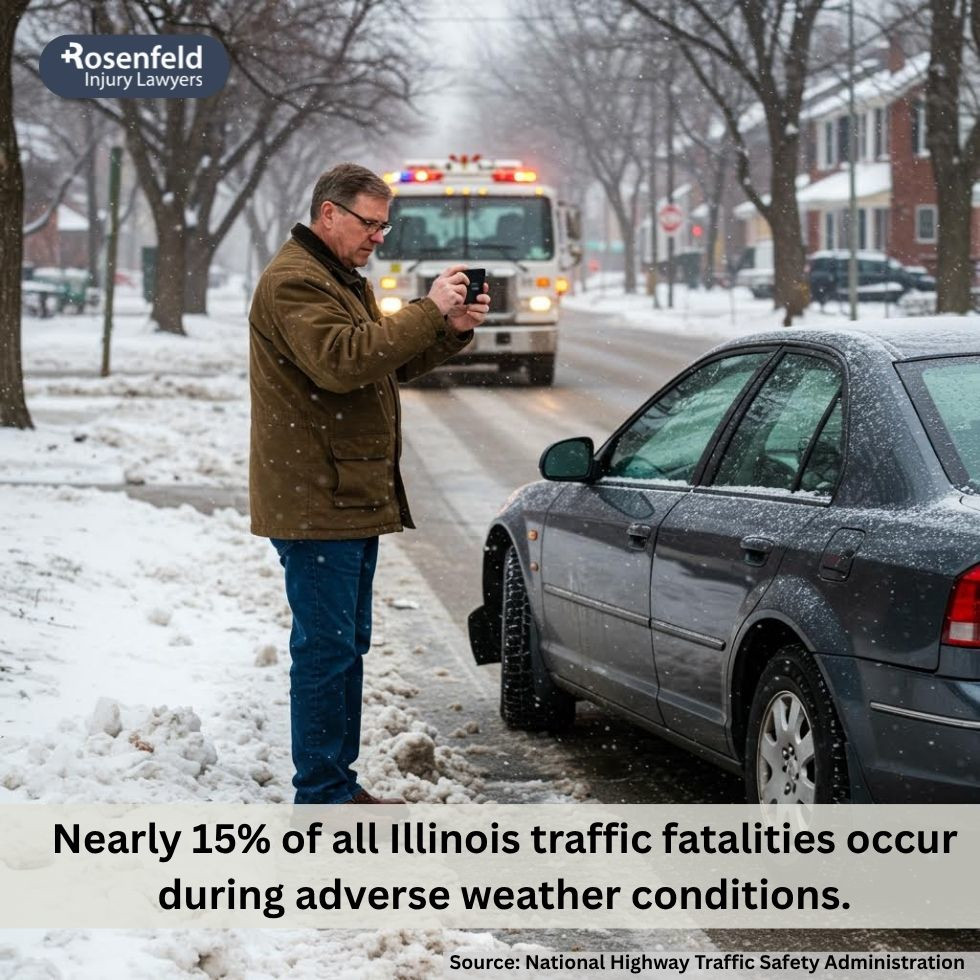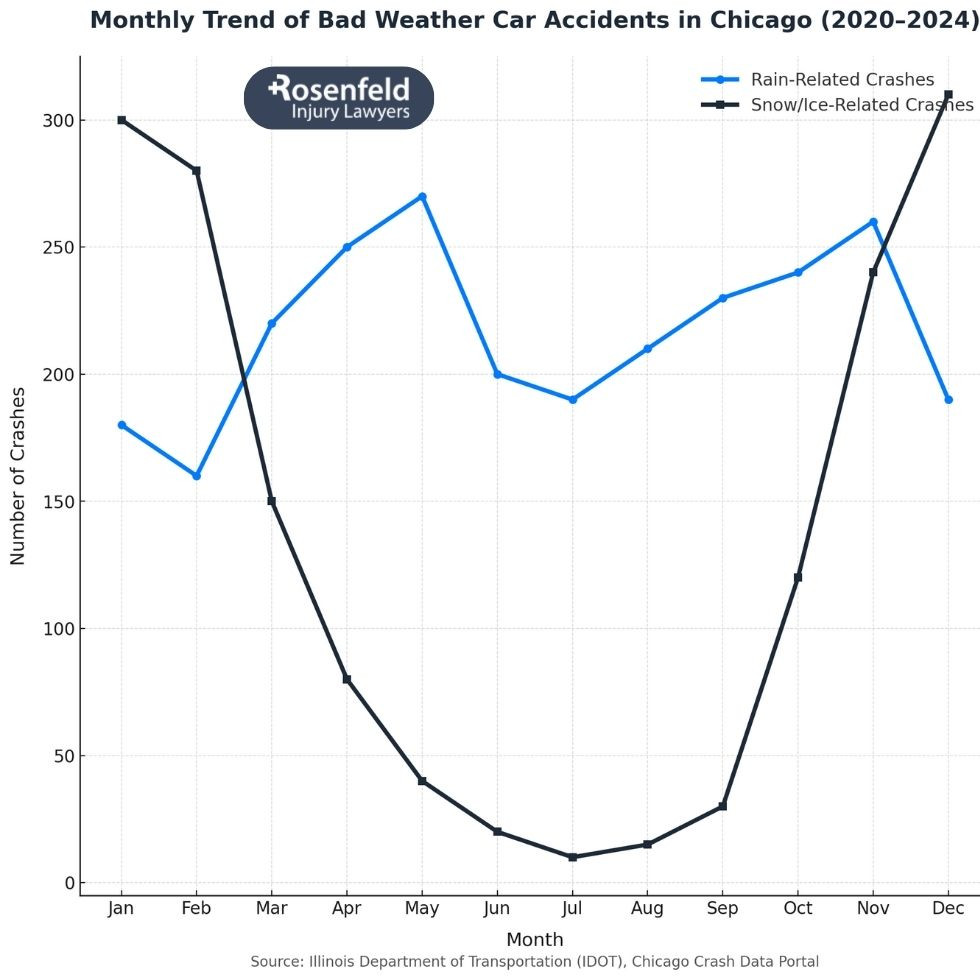- 24/7 Free Consultation: (888) 424-5757 Tap Here To Call Us
Understanding Fault, Liability, and Compensation in Bad Weather Car Accidents in Chicago

Chicago drivers face a unique set of challenges during severe weather conditions. Lake-effect snow, black ice, freezing rain, and high winds can quickly turn even a short trip into a dangerous ordeal. Congested expressways, narrow residential streets, and bad weather amplify the risk of car accidents and make safe driving even more critical.
According to the US Department of Transportation, 24% of weather-related accidents happened on snow, slush, or ice-covered pavements, with another 75% of weather-related accidents happening on wet pavement. These harsh conditions contribute to poor visibility and a loss of traction, leading to serious and even fatal accidents.
Even though environmental conditions play a role, that doesn’t mean you lose your right to file a claim.
Successful Car Accident Settlements
Our firm has recovered substantial settlements for crash victims across Illinois. These examples show the range of serious injuries our clients have faced and the results we’ve achieved to help them rebuild.
- $2,000,000 settlement for rollover crash injuries, recovering the full policy limits.
- $1,600,000 recovery for a rear-end crash victim who required lumbar fusion surgery for a herniated disc.
- $449,000 settlement was awarded to a woman who sustained facial trauma after hitting the windshield during a collision.
If you or a loved one has been hurt in a crash, contact us for a free consultation. An experienced car accident lawyer in Chicago will evaluate your case and help you understand your legal options.

Common Causes of Bad Weather Car Accidents
Poor weather demands greater caution. Many of these collisions happen because drivers fail to adjust to road and visibility conditions. Common causes include:
- Speeding in poor conditions
- Fog and low visibility
- Icy pavement and black ice
- Wet roads and hydroplaning
- Pavement temperature affecting traction
- Wind-blown debris on highways
- Driver error in merges or lane changes
Types of Car Accidents Caused by Bad Weather
The elements can often influence the type of car accident. In Chicago, we frequently see the following types of car accidents caused by bad weather:
Rear-End Collisions Due to Poor Stopping Distance: Snow, sleet, and icy pavement can extend braking times, making rear-end crashes common. A negligent driver who fails to slow down or leave a safe distance in poor weather conditions may be liable for any resulting personal injury.
Sideswipe Accidents from Wind Gusts: High winds can push cars out of their lanes, especially on bridges or open highways. Drivers who overcorrect or fail to use proper traction control systems risk losing control and sideswiping nearby cars.
Intersection Crashes from Icy or Wet Stops: Slippery intersections are a major hazard, particularly when drivers approach too quickly or slam the brakes, making it difficult to maintain control of the car. Many of these crashes occur when tire pressure is too low to grip the road properly.
Highway Pileups in Whiteout or Fog Conditions: Low visibility increases the chances of multi-car accidents. When one car stops suddenly, others behind may not see it in time to react, especially if they’re driving too fast for the conditions. These chain-reaction car collisions often require accident reconstruction and legal guidance to determine fault.
Lane-Departure Accidents on Slick Roads: Slush and standing water can cause a car to veer out of its lane or skid into oncoming traffic. Inexperienced or reckless drivers are especially prone to losing control when roads are wet, icy, or uneven.
Common Injuries in Weather-Related Car Crashes
Accidents caused by bad weather can result in serious injuries, especially when visibility is low or road surfaces are slick. Victims often suffer from:
- Whiplash and soft tissue injuries
- Concussions and traumatic brain injuries
- Broken bones or fractures
- Back and spinal cord injuries
- Internal bleeding from high-impact collisions
Even minor accidents in rough weather can cause long-term health issues. Always seek medical attention after a crash, even if your symptoms seem mild at first.
Illinois Laws on Driving in Bad Weather
Drivers are legally required to adjust their behavior when conditions make the roads more dangerous. Several key laws apply in these cases:
- 625 ILCS 5/11-601(a) – Drivers must reduce speed to account for weather, visibility, and road conditions.
- 625 ILCS 5/11-1002 – Drivers must yield to pedestrians, even in low visibility or snow-covered areas.
- 735 ILCS 5/2-1116 – Illinois’ comparative fault rule means drivers who fail to adjust to conditions may still be held liable, even if weather contributed to the crash.
Chicago also enforces snow emergency routes and may reduce posted speed limits during major storms. Other drivers who fail to comply with these local rules can strengthen your claim.

How to Prove Liability in a Weather-Related Crash
Establishing fault in a weather-related car accident can be complex, but our attorneys are experienced in gathering the evidence needed to build a strong case. Vital evidence includes:
- Police reports that document environmental conditions and an initial determination of fault.
- Traffic camera or dash cam footage showing how the crash occurred.
- Eyewitness statements from passengers, pedestrians, or other drivers.
- Car telematics or black box data indicating speed and braking.
- Accident reconstruction expert testimony.
- Analysis of skid marks, car position, and road surface conditions
Even when the weather is bad, drivers have a responsibility to drive safely. If they don’t, they can be held accountable.
7 Tips to Avoid a Car Crash in Bad Weather Conditions
Safe driving starts with taking the necessary precautions. To reduce your risk during severe weather:
1. Slow Down—Even Below Posted Limits
Driving too fast on wet pavement or in winter weather is one of the leading causes of crashes. Snow, slush, and standing water reduce traction, making it easier to hydroplane or slide into other cars. Slowing down gives you more control and more time to react, especially in adverse weather conditions when the road surface is unpredictable.
2. Keep Headlights On—Day or Night
Visibility drops significantly during storms, fog, or snow flurries. Keeping your headlights on helps you see and makes your car more visible to other vehicles on the road. In hazardous conditions, this small habit can prevent serious accidents by improving awareness and reaction time.
3. Double Your Following Distance
Increased stopping distance is critical when roads are slick due to wet pavement or snow. Tailgating becomes especially dangerous in winter weather, where it’s easy to slide even at low speeds. Give yourself at least twice the usual space to stop safely and avoid rear-ending other vehicles.
4. Don’t Drive in Storms Unless Necessary
If conditions are too dangerous—whiteouts, freezing rain, or heavy snowfall—it’s safest to delay your trip. Many climate-related accidents happen when drivers underestimate inclement weather.
5. Prepare Your Car
Before heading out in snow or rain, make sure to take the necessary precautions. Equip it with snow tires or all-season tires with good tread for wet pavement. Keep a windshield de-icer, snow brush, shovel, cell phone charger, and an emergency kit in the trunk. Proper tire pressure and functioning wipers are essential for handling rain and snow.
6. Stay Focused—Avoid Distracted Driving
The winter season demands your full attention. Distractions like texting, eating, or fiddling with the radio increase the odds of a crash, especially on wet pavement. Stay alert to changing road conditions and other vehicles that may lose traction or visibility.
7. Know How to Handle Skids
If your car starts to slide on wet pavement or snow, remain calm. Ease off the gas and steer gently in the direction you want to go. Overcorrecting can make you spin out or collide with other vehicles. Practicing safe skid recovery techniques helps you maintain control when bad weather conditions strike unexpectedly.
Even if you’re prepared, sometimes the conditions or other drivers make accidents unavoidable, so it’s critical to know what to do after an accident.

What to Do After a Chicago Car Accident Caused by Bad Weather
If you’re involved in a crash during poor weather conditions, take the following steps to protect yourself and your claim:
- Call 911 and report the accident
- Request a police report (for evidence and insurance)
- Seek medical attention, even for minor injuries
- Document the scene: weather conditions, damage, location
- Collect witness info and take timestamped photos
- Contact a car accident attorney to discuss your case
The sooner you take action, the better your chances of preserving evidence and holding the right party accountable.
Can I Still File a Claim if Weather Played a Role?
Yes. Even if the elements contributed to the car accident, another driver may still be legally at fault. Under Illinois’ modified comparative negligence system, you can recover compensation if you are less than 51% responsible for the crash. If another driver was speeding, tailgating, or failing to adjust to the weather conditions, they may still be considered negligent.
Our attorneys can help assess the circumstances, assign liability, and challenge insurance companies that try to deny valid claims by blaming the elements alone.
Speak with a Chicago Car Accident Attorney Today

Our legal team investigates every angle, works with expert witnesses, and negotiates aggressively with insurance companies to pursue the maximum compensation for your injuries and losses.
Schedule a free consultation today with our Chicago car accident lawyers. There are no upfront fees, and we don’t get paid unless you win. Let us help you move forward after a serious car accident.
Contact us at (888) 424-5757 or through our contact form to discuss your legal options.
All content undergoes thorough legal review by experienced attorneys, including Jonathan Rosenfeld. With 25 years of experience in personal injury law and over 100 years of combined legal expertise within our team, we ensure that every article is legally accurate, compliant, and reflects current legal standards.







